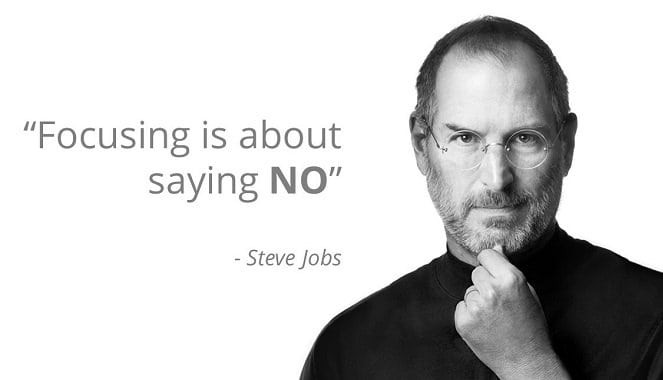

Do you struggle to say 'No' to requests that you don't want to accept in your workplace? Do you fear retaliation or rejection from the other person? Saying 'No' in the workplace is a crucial skill that Leaders need to develop to be able to manage time and priorities effectively.
Executives regularly come across requests that they do not always want to accept or accommodate, due to work demands and pressures. However, an individual pressed for time can struggle with something as simple as - Scheduling a better time to discuss an issue with a peer who bursts in unexpectedly into their office!
In our hearts, we want to be seen and known as being helpful and supportive. However, the possibility of accommodating all requests, with no filters, is unrealistic and can create immense stress.
Leader Focus: A leader's most significant work is around strategy, big picture thinking, reviews of industry trends that impact business, creating robust networks and giving teams direction. Leaders need uninterrupted time to implement their key role requirements, effectively. Saying 'No' to distractions and unnecessary tasks become important to stay focused.
Time Management: Time management continues to be one of the biggest challenges that executives face in the workplace. To manage time, one has to create boundaries to keep out unwanted interruptions that are not linked to our goals.
Stress and Well Being: We have all experienced frustration and anger at having to do tasks that we did not want to, but agreed to do under pressure or due to our inner fears. When leaders have to race against the clock to get things done, it robs them of the time they need for their well- being, adequate sleep, rest and doing meaningful things like spending time with family and their loved ones.
The effect on their well-being in turn has a negative impact on their presence and energy levels in the workplace.
Fear of losing the relationship emerges as the biggest reason, people land up saying Yes instead of No. There is a fear of hurting the other person, disappointing them or making them angry by saying NO.
Another fear is that, if one says NO to a request, then the other person will not cooperate in the future.
Leaders may perceive themselves as being unhelpful and unkind when they say no to a colleague.
Very often Leaders continue to say YES to tasks due to the precedents or routines that they have set up in the past.
1. It starts with having a firm grasp on priorities, values and goals
Clarity and unwavering commitment to one's values, priorities and goals play an important role in choosing what you want to say yes to. When a Leader is completely aligned to all of the above, it becomes a lot easier to say NO to unwanted or perhaps unplanned requests. In the long run, people respect leaders who work with focus and their values.
For example, let's say at the start of the day, you have committed to reviewing your processes and have set aside time for it. Should a senior colleague unexpectedly walk in with a problem he wants help in resolving, respectfully inform him of your lack of time, and negotiate a time for discussion later on? If the problem is urgent, you may need to attend to it right then, however, you can be specific about the amount of time you have to give (for example, twenty minutes) so that the other person is focused and respects your constraints.

2. Where appropriate, provide reasons for your 'NO'
When people hear, a genuine reason for saying NO, they may be disappointed, however, unless they are very insensitive, they will consider your situation and even empathize with it. Hence there is no reason that they will not cooperate with you in the future.
For example, if you colleague approaches you for some of your extra time on a project, you might want to say - Anita, while I would have liked to help you with this, I am sincerely racing against time to meet this deadline. I cannot let the customer down by delaying the delivery, as it will impact the organisation's reputation and credibility.
3. Focus on the Quality of your 'NO'
People are not going to remember what you said, they will remember how you made them feel! This helps in keeping the relationship intact! When we deliver the message with sincerity, respect, honesty and kindness we don't lose people, we earn them.
A firm but kind tone works well. This coupled with a calm demeanour (even though you may feel nervous inside!) clear eye contact and an upright, relaxed posture shows the person you mean what you say.
Gary Keller, American Entrepreneur and the best-selling author uses this principle to say NO: sandwich it with tough love! For example, if a colleague you respect requests you to sit in a discussion which you feel is not necessary when you sandwich it with tough love you can say - "Thanks for asking me Peter, I sincerely appreciate it. However, I am committed to my mid-term review, which will take up a great deal of my time, hence I will be unable to join the meeting. I hope it will be a good one for you!"
4. Avoid Being Vague Being a busy leader and having multiple things to do, may mean not wanting to deal with the conversation at the time. However, it serves your purpose to give a straight NO rather than tell people you will get back to them later, just to avoid an immediate conversation.
To avoid hurting feelings, do not be vague in your responses as it will raise false hopes and lead to conflict later. It also makes one seem indecisive and slows down the process of determining who is going to be helping. When we mean what we say, others see us as having integrity.
5. Redirect and Referral Is there anyone whom the person approaching you with a request, can be referred to? The person will appreciate your effort in connecting them with someone who can assist, even if you may not be able to help them yourself.
Finally getting comfortable with saying 'No' comes with practice. It needs courage and once you take the first steps, it gets easier.
Setting healthy boundaries is not a sign of being unhelpful, but a sign of living a life that is purpose-driven and stress-free.
 10 Powerful End-of-the-Year Reflecti ...
Socrates said, “The unexamined life is not worth living.” For leaders, the unexamined year becomes a missed opportunity for intentional growth. ...
Read More
10 Powerful End-of-the-Year Reflecti ...
Socrates said, “The unexamined life is not worth living.” For leaders, the unexamined year becomes a missed opportunity for intentional growth. ...
Read More
 How Emotional Intelligence Builds Ex ...
Leadership is not about being in charge. It's about taking care of those in your charge. -Simon Sinek In today's complex, fast-paced business world, te ...
Read More
How Emotional Intelligence Builds Ex ...
Leadership is not about being in charge. It's about taking care of those in your charge. -Simon Sinek In today's complex, fast-paced business world, te ...
Read More
 5 Ways to Communicate Effectively in ...
Let's face it - Conflict is an inevitable part of life, whether in personal relationships, the workplace, or social settings. Conflict arises when your ideas, needs and beliefs differ from ...
Read More
5 Ways to Communicate Effectively in ...
Let's face it - Conflict is an inevitable part of life, whether in personal relationships, the workplace, or social settings. Conflict arises when your ideas, needs and beliefs differ from ...
Read More